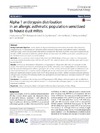Identificador persistente para citar o vincular este elemento:
https://accedacris.ulpgc.es/jspui/handle/10553/48609
| Título: | Alpha 1 antitrypsin distribution in an allergic asthmatic population sensitized to house dust mites | Autores/as: | Suárez-Lorenzo, I. Rodríguez-de Castro, Felipe Cruz-Niesvaara, D. Herrera-Ramos, E. Rodríguez-Gallego, C. Carrillo-Díaz, T. |
Clasificación UNESCO: | 32 Ciencias médicas 320508 Enfermedades pulmonares 320701 Alergias |
Palabras clave: | Alpha 1 antitrypsin Alpha 1 antitrypsin deficiency House dust mites Asthma Allergy |
Fecha de publicación: | 2018 | Proyectos: | Neuroprotección por bloqueo de la capacidad de transactivadora Nf-Kb y factores relacionados. | Publicación seriada: | Clinical and Translational Allergy | Resumen: | Background and objective: Severe alpha1 antitrypsin deficiency has been clearly associated with pulmonary emphysema, but its relationship with bronchial asthma remains controversial. Some deficient alpha 1 antitrypsin (AAT) genotypes seem to be associated with asthma development. The objective of this study was to analyze the distribution of AAT genotypes in asthmatic patients allergic to house dust mites (HDM), and to asses a possible association between these genotypes and severe asthma.MethodsA cross-sectional cohort study of 648 patients with HDM allergic asthma was carried out. Demographic, clinical and analytical variables were collected. PI*S and PI*Z AAT deficient alleles of the SERPINA1 gene were assayed by real-time PCR.ResultsAsthma was intermittent in 253 patients and persistent in 395 patients (246 mild, 101 moderate and 48 severe). One hundred and forty-five asthmatic patients (22.4%) with at least one mutated allele (S or Z) were identified. No association between the different genotypes and asthma severity was found. No significant differences in all clinical and functional tests, as well as nasal eosinophils, IgA and IgE serum levels were observed. Peripheral eosinophils were significantly lower in patients with the PI*MS genotype (p=0.0228). Neither association between deficient AAT genotypes or serum ATT deficiency (AATD) and development of severe asthma, or correlation between ATT levels and FEV1 was observed.ConclusionIn conclusion, the distribution of AAT genotypes in HDM allergic asthmatic patients did not differ from those found in Spanish population. Neither severe ATTD or deficient AAT genotypes appear to confer different clinical expression of asthma. | URI: | https://accedacris.ulpgc.es/handle/10553/48609 | ISSN: | 2045-7022 | DOI: | 10.1186/s13601-018-0231-x | Fuente: | Clinical and Translational Allergy [ISSN 2045-7022], v. 8, 44 (Noviembre 2018) |
| Colección: | Artículos |
Citas SCOPUSTM
19
actualizado el 08-jun-2025
Citas de WEB OF SCIENCETM
Citations
23
actualizado el 12-ene-2026
Visitas
81
actualizado el 11-ene-2026
Descargas
81
actualizado el 11-ene-2026
Google ScholarTM
Verifica
Altmetric
Comparte
Exporta metadatos
Los elementos en ULPGC accedaCRIS están protegidos por derechos de autor con todos los derechos reservados, a menos que se indique lo contrario.
